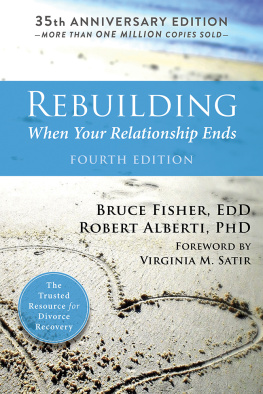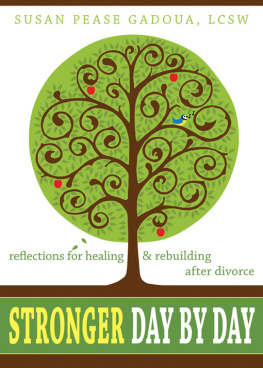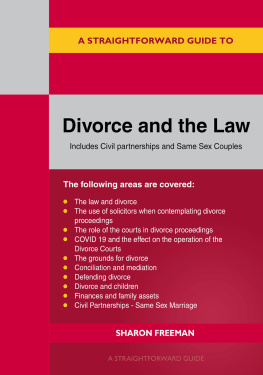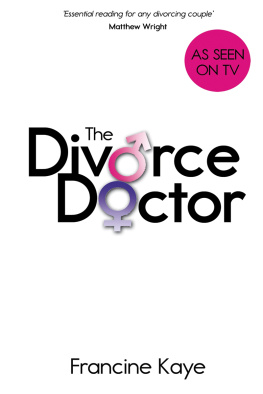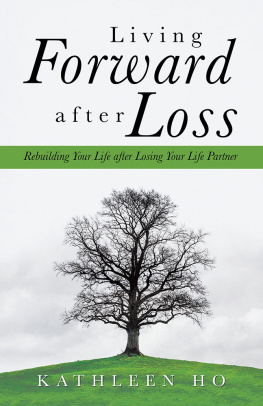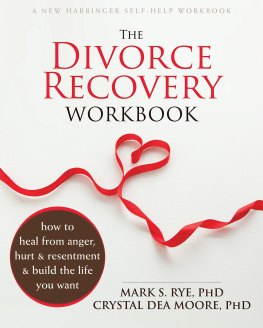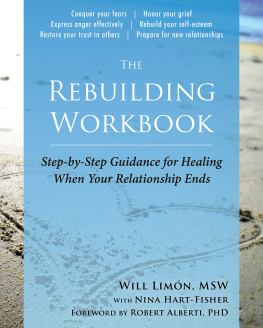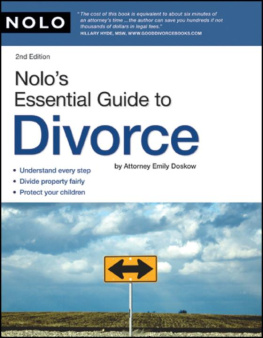
One of the best books written for the divorcing personwarm, engaging.
theBehavior Therapist
Deals with the everyday feelings and problems of the divorcing and divorcedhits just the right balance between seriousness and optimism.
FlorenceKaslow, PhD, Journal of Marital and Family Therapy
A handbook for the divorcing and divorced that is authentic and which they can employ in the rebuilding of their own lives.
EstherOshiverFisher, JD, Journal of Divorce
Warm, simple, and directthis is a book you will not want to put down.
A.R.E. Press
I found the book comforting, helpful, and realisticit is going to hurt, and it will not be easy, but you can do it.
MarilynAnitaDalrymple, Affaire de Coeur
If youre putting your life back together after a divorce, you need this book! It could be just what youre looking for to help you get your life back on track. I found it to be very interesting and informative.
JeanetteWright, Borger News-Herald
Shows you how to move from denial to freedom and even another love.
JannMitchell, The Sunday Oregonian
Exactly what you need to help put your life back together during and after a divorce.
Divorce Magazine
Fisher and Alberti accompany you on your journey of recovery as they teach you in plain English how to move forward after the ending of an important love relationship. They are like Sherpas guiding you through the difficult mountain passes and over the perilous ravines. With kindness and optimism, they help you find your way.
JeffZimmerman, PhD, ABPP, psychologist and coauthor of Adult Children of Divorce and The Co-Parenting Survival Guide
If youre suffering following a divorce or breakup, this outstanding book should be at the top of your reading list! Rebuilding combines compassionate insights with practical suggestions for finding healing.
MarkS. Rye, PhD, professor of psychology at Skidmore College, and coauthor of The Divorce Recovery Workbook
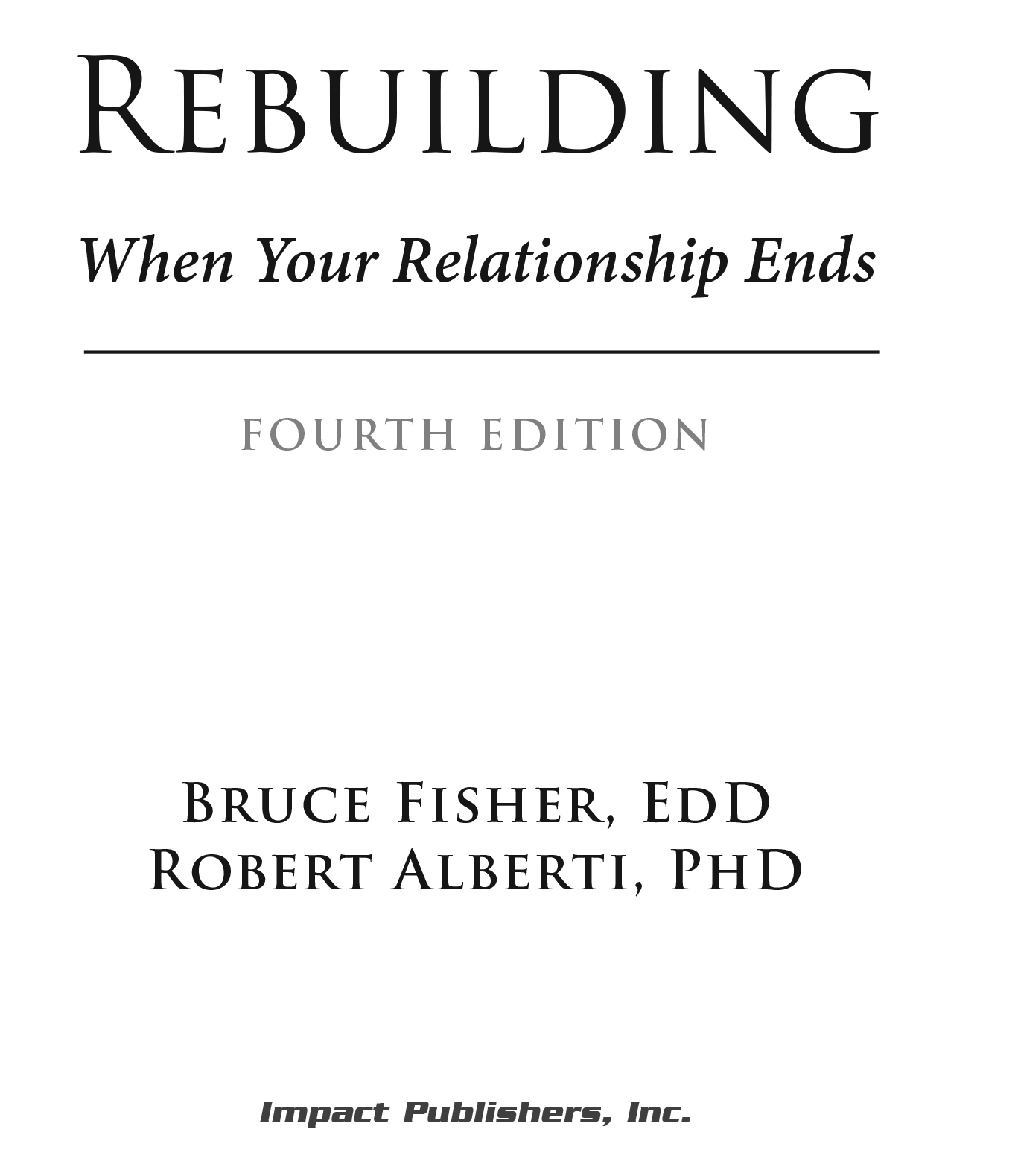
Publishers Note
This publication is designed to provide accurate and authoritative information in regard to the subject matter covered. It is sold with the understanding that the publisher is not engaged in rendering psychological, financial, legal, or other professional services. If expert assistance or counseling is needed, the services of a competent professional should be sought.
Distributed in Canada by Raincoast Books
Copyright 2016 by Bruce Fisher and Robert Alberti
Impact Publishers
An imprint of New Harbinger Publications, Inc.
5674 Shattuck Avenue
Oakland, CA 94609
www.newharbinger.com
Cover design by Amy Shoup
All Rights Reserved
Library of Congress Cataloging-in-Publication Data on file
This book is dedicated to
the thousands of people who, while I was attempting to teach them in the rebuilding classes, taught me much of what Ive written in this book;
my children, Rob, Todd, and Sheila, who often, through their love, gave me more reality, feedback, and truth than I was ready to hear;
my parents, Bill and Vera, because the more I understand life, families, and myself, the more I appreciate the gifts of life and love they gave me; and
my wife, Nina, who, with her love, often gave me what I needed instead of what I wanted.
Finally, a word of thanks to my coauthor, editor, and publisher, Bob Alberti, who helped it turn out the way I wanted it to.
Bruce Fisher (19311998)
my parents, Carita and Sam, who showed melong before I had any formal training in psychologythat divorce, while painful, can be a growth experience for adults and children, and that we all can be healthier and happier at the end of the day; and
Bruce, who showed us all how to make that happen.
Bob Alberti
Contents
T his fourth edition of Rebuilding is the first for which I am no longer the editor and publisher. My excellent team at New Harbinger Publicationscopy editor Cindy Nixon, editorial manager Clancy Drake, and acquisitions manager Tesilya Hanauerhave made the transition from editor to edited much easier and more pleasant than I would have imagined. They showed me just how much we could improve the book after three successful editions and over a million copies. I, along with you readers of this edition, owe them many thanks!
Virginia M. Satir, MSW
D ivorce is a metaphorical surgery that affects all areas of life of the individual. I have often said that the roots of divorce are in the circumstances and hopes at the time of marriage. Many, many, many people marry with the idea that life is going to be better. Perhaps only a fool would enter into marriage thinking that would not be the case. The depth of disappointment at the time of divorce will depend upon how much more one wants to get out of life or how much more one feels it necessary to add someone to ones life to make life worthwhile.
For many people, divorce is a broken experience, and before they can go on with their lives, they need to be able to pick up the pieces. This period often includes deep emotional feelings of despair, disappointment, revenge, retaliation, hopelessness, and helplessness. People need to develop a whole new orientation to the life that will come. And they need time to mourn what was hoped and to realize that the hope will not manifest itself.
Many books on divorce talk only about the problems. Of course, there are the injury to the ego, diminished feeling of self-worth, constant nagging questions about what went wrong, and many fears about the future. Dr. Fisher has given us a very practical and useful framework within which to examine the grief period, to take a look at where one is, and to determine directions for the future. He offers step-by-step guides to getting oneself in a position to enjoy the life that comes after the divorce. He presents it as a period in which one can learn from the past, get to know oneself better, and also develop new parts of the self that were previously unknown. An apt analogy would be that of the convalescence which occurs after any kind of surgery.
The emotional levels one needs to work through during and following divorce are very much parallel to the stages one goes through at the time of death. At first, there is a denial of the events that have taken place and a consequent feeling of wanting to isolate oneself from the whole situation. Then anger, wherein one blames someone else for ones predicament. The third level is bargaining; a kind of situation in which one wants to look at the ledger to see that things are equal. This is often manifest in the custody of children and property settlements at the time of divorce. Then comes a period of depression, which is where much self-hatred, self-blame, and feelings of failure are present. Finally, after all of this, one comes to acceptance of the situation and acceptance of the self. Out of this comes hope for what can happen.
I believe Bruce Fishers book makes it possible for people to work through these various levels, stage by stage. It is important to give this rebuilding period the time it needs, to awaken parts of the self that have been paralyzed, repressed, or unknown. Let each selfin this case, the divorced personcome into the next part of life with hope rather than failure!
Next page
